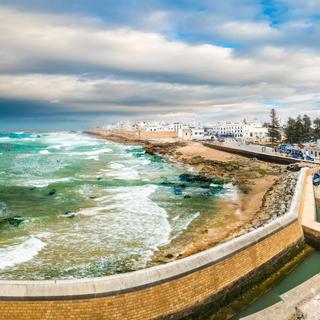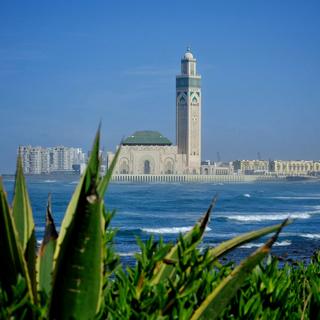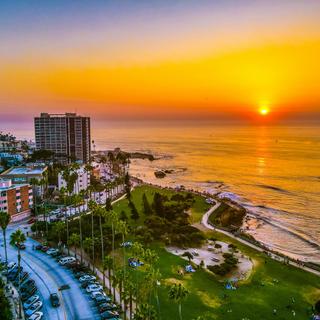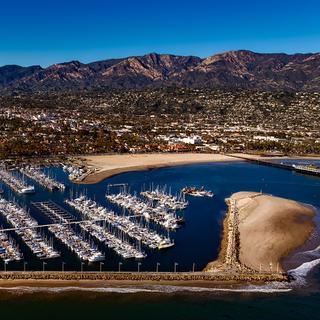
San Diego weather and climate

San Diego weather and climate
Day
27 °C
Night
18 °C
Sea
21 °C
Precipitation
2 mm
in month
Rainy days
0 days
in month
Daylight
13 hours
average
Sunshine
10 hours
average
Humidity
74 %
Weather charts for San Diego
Destinations nearby and activities
Destinations nearby
Activities in San Diego

Find more destinations like this
Destinations with similar weather to San Diego
Other destinations in California - South coast
Closest cities for San Diego
Weather overview for San Diego
Weather overview
Characterized by its idyllic tropical weather, the charming city of San Diego in the sunny state of California offers a comfortable climate throughout the year. Daytime temperatures pleasantly vary from a mild 19 °C (66 °F) in the cooler month of December to a warm 27 °C (80 °F) during the peak of summer in August. The region experiences its least amount of rainfall in August, with barely 0 days recorded as wet days, while February stands out as the month with the highest rainfall, witnessing 6 days of precipitation. Nighttime temperatures follow a similar pattern, with the coziest evenings in August showing an 18 °C (65 °F), contrasting with the crisp nights of December at 9 °C (48 °F). The Pacific Ocean lures with a sea temperature range that goes from a brisk 15 °C (59 °F) in February to a balmy 21 °C (69 °F) in August.
January weather
January in San Diego marks the point when the fewest rainy days are noted, tallying approximately 6 days, while the accompanying rainfall quantity also begins its ascension compared to the preceding month, measuring 54 mm (2.13 in). The ocean temperature maintains its gradual decline, settling at 15 °C (59 °F), and the minimal humidity levels can be recognized.
February weather
February in San Diego is characterized by the nadir of oceanic warmth, alongside a peak in the number of rainy days, totaling 6 days. One can also witness the highest levels of accumulated rainfall for the year, amounting to 60 mm (2.38 in). The initial uptick in sunshine hours is observable, clocking in at 8 hours per serene, sunlit day.
March weather
The commencement of warming day temperatures is noticeable in March in San Diego, achieving 20 °C (67 °F), while the ascendance of comfortable night temperatures is also seen. The reduction of rainfall frequency commences, reflected in a mere 6 days recorded, and the volume of precipitation equally demonstrates a decline. The trend of increasing sunny hours continues, with an increase to 8 hours.
April weather
San Diego celebrates the start of rising ocean temperatures in April, reaching 16 °C (61 °F). The continued elevation in daytime heat registers at 21 °C (70 °F), while the dwindling rainy days are signified by 3 days, and a parallel decrease in precipitation amount is also evident, with 23 mm (0.91 in). The night temperatures experience a boost as well, notching up to 12 °C (54 °F), and April showcases the zenith of wind speeds.
May weather
With the advent of May, temperatures in San Diego continue their ascent to 22 °C (71 °F) during the day, while ocean warmth follows suit, evidenced by 17 °C (63 °F). The trend toward fewer wet days persists, cited at 1 day. The dry season is in full swing, and the journey toward milder night temperatures continues, marked by 14 °C (58 °F).
June weather
June ushers in the start of San Diego's tourist season under the canopy of a prevalent dry season. Day temperatures further elevate to an inviting 23 °C (74 °F), complemented by rising sea temperatures of 18 °C (65 °F). The rain's retreat is notable, and the progression of night temperature warmth is appreciable at 16 °C (60 °F).
July weather
San Diego's tourist season hits its stride in July. The day temperature climbs to a summery 26 °C (78 °F), and the ocean's heat tags along at 20 °C (68 °F). The lightest rainfall footprint is traceable in July, and the increasing nighttime warmth is warmly welcomed at 18 °C (64 °F).
August weather
August sees the tourist season in San Diego at full tilt. Sea temperatures reach their summit at 21 °C (69 °F), mirrored by the highest observed daytime highs averaging 27 °C (80 °F). The months of sparse rainfall hit rock bottom with 0 days. Night temperatures peak at 18 °C (65 °F), and the sunny hours begin their slow regression at 10 hours.
September weather
September in San Diego marks an inflection point where the initial rise in rainy days is detectable. Despite the lingering dry and tourist seasons, a slight decrease in sunlit hours to 8 hours is noted. The nighttime temperatures start to show a cooling trend.
October weather
October in San Diego signals the beginning of cooler days, recorded at 24 °C (76 °F), and a slight decline in sea temperature. The tourist season remains in near full swing, with a progressive increase in wet days observed, up to 2 days, and a creeping escalation in rainfall figures, registering 11 mm (0.44 in).
November weather
By November, the descending day temperature in San Diego measures 22 °C (72 °F), in tandem with the downward trend in sea warmth at 17 °C (63 °F). An uptick in precipitation is noted, both in count of rainy days, coming in at 4 days, and rainfall volume, amassing 31 mm (1.23 in).
December weather
December in San Diego presents the lowest day temperatures of the year, bottoming out at 19 °C (66 °F), accompanied by a continued reduction in sea temperature to 16 °C (60 °F). Rainy days proliferate, tallying at 5 days, and the least amount of sunshine hours is recognized at 7 hours.
FAQs
What is the lowest temperature during the night in January in San Diego?
The lowest night temperature in San Diego for January is 9 °C (48 °F).
What's the average number of days with rain in San Diego during February?
Expect on average about 6 days of rainfall in San Diego throughout February.
What is the sea temperature like in March in San Diego?
The sea temperature in San Diego during March averages 15 °C (60 °F).
What is the level of humidity in San Diego during April?
April in San Diego has an average humidity of about 68 %.
Are wind conditions strong in San Diego during May?
Wind conditions in San Diego throughout May average at a gentle 3 m/s.
How much daylight is there in San Diego in June?
June in San Diego enjoys ample daylight with an average of 14 hours per day.
How many hours of sunshine can I expect in San Diego in July?
July in San Diego boasts an impressive 10 hours of sunshine on average per day.
What is the average wind speed in San Diego in August?
The typical wind speed in August in San Diego is around 3 m/s.
What's the daily maximum temperature in San Diego for September?
The average daytime maximum temperature for September in San Diego is approximately 26 °C (79 °F).
What's the relative humidity in San Diego during October?
October in San Diego sees an average relative humidity of about 70 %.
How much sunshine can I expect in November in San Diego?
Expect an average of around 8 hours of sunshine per day in November in San Diego.
How extensive is the day length in December in San Diego?
Day length in December in San Diego averages approximately 10 hours.











